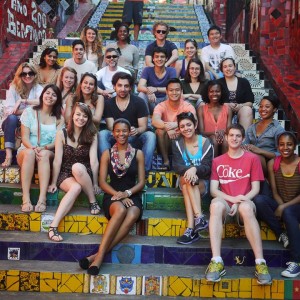Over the course of the semester, PCURs will reflect on the professors, advisers, and friends who shaped their research experiences. We present these to you as a series called Mentorship in Research. Most undergraduates have met, or will meet, an individual who motivates and supports their independent work. Here, Dylan shares his story.
~~~~~~
“Everything you might write has been written before,” said Professor Pedro Meira Monteiro, my adviser, leaning back into his chair.
I was in a JP meeting in his cozy, naturally lit East Pyne office. The paper had me in high-stress mode, but I was in good hands. Somehow, hearing that all work is derivative and unoriginal did wonders to immediately calm me down.
Let me explain.

I am writing my JP about Nise da Silveira, a Brazilian psychoanalyst who taught painting and sculpture to schizophrenic patients as a means of treatment. This paper is meant to prepare me for my summer research in Rio de Janeiro, where I’ll look at current artists who use da Silveira’s teachings as creative inspiration. My JP is, to a certain degree, an appetizer — the background knowledge I need to enrich my summer work.
And yet, the deeper I got into my topic, the more I faced the sinking feeling that I couldn’t contribute much to the scholarly discussion — at least not until I got to Brazil and did my interviews.
I started like I would any other research project: with the literature. My topic is just obscure enough that Firestone had next to nothing in stock, but just mainstream enough that I could order a tall stack of books from BorrowDirect to accompany the articles I found online. The readings fascinated me. Born in 1905, da Silveira was the only woman to graduate from her university in 1926. Ten years later, she was imprisoned for her communist beliefs. After more than a year in jail and eight years in exile, she returned to Rio and, shortly thereafter, took over the occupational therapy wing at one of the oldest psychiatric institutes in the Americas.
Despite my fascination with da Silveira’s story, none of this reading was leading to any writing. I felt lost. I was supposed to bring the beginnings of my JP to my adviser, but instead I had written … nothing.
Luckily, adviser meetings are therapy for my research soul. Sipping on an espresso Professor Meira Monteiro had made for me on his coffee maker, I ranted in jumbled Portuguese about my frustrations. No matter how much I read and thought about the work, I told him, I couldn’t put my fingers to the keyboard to write an outline, let alone the beginnings of an essay. When I was done, he thought for a moment before speaking. “You know that saying? Everything you might write has been written before?” he asked. I nodded yes. “So stop worrying! Just write!”
It was like angels had descended and lifted a heavy weight off my shoulders. Professor Meira Monteiro continued: if I wanted to find my own voice and opinions, then I would have to pick a detail that sparked my interest — and just write. And not even think about originality.
They were important words to hear — especially from my adviser. At Princeton, it’s easy to think that success and novelty are one and the same. But to produce successful writing — and research, for that matter — it’s important to focus on making it you. Just as no two actors can deliver a line the same way (something I’ve come to know as a student of theater), no two researchers can present a topic with the same eyes. Our unique perspective gives research its value. That might seem like an obvious idea, but I didn’t apply it to academia until my adviser reassured me that putting words in my own voice was enough. Sometimes, all it takes is a little push in the right direction.
— Dylan Blau Edelstein, Humanities Correspondent

